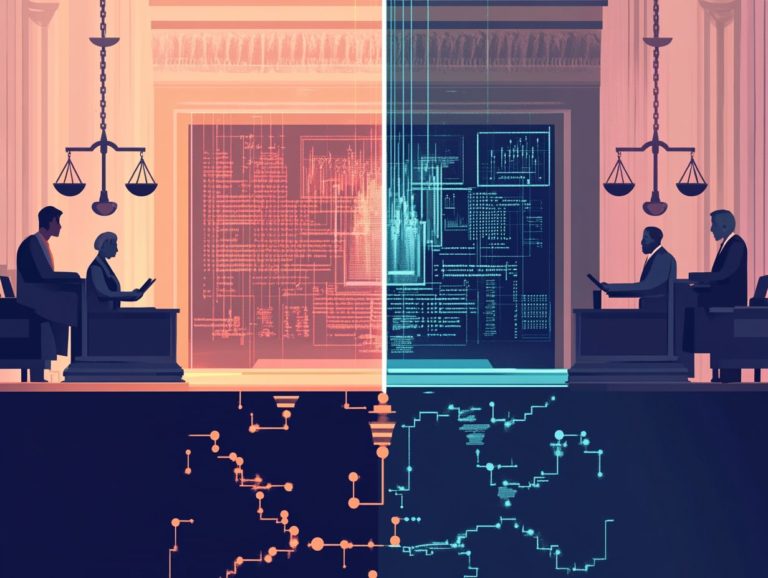5 Reasons to Consider Alternative Dispute Resolution
In today s fast-paced world, efficiently and effectively resolving disputes is crucial for both individuals and businesses.
Alternative Dispute Resolution (ADR) presents a compelling solution, offering quicker resolutions, cost savings, and greater control over outcomes.
Discover five compelling reasons to consider ADR now and gain insights into its various types while highlighting how it differs from traditional litigation.
Whether you are a business leader or an individual entangled in a dispute, understanding the nuances of ADR can empower you to navigate conflicts while maintaining valuable relationships.
Continue reading to uncover the benefits and considerations of this invaluable approach.
Contents
- Key Takeaways:
- 1. Faster Resolution of Disputes
- 2. Cost-Effective Option
- 3. More Control Over the Outcome
- 4. Confidentiality and Privacy
- 5. Preserves Relationships
- What Is Alternative Dispute Resolution (ADR)?
- What Are the Different Types of ADR?
- How Does ADR Differ from Traditional Litigation?
- What Types of Disputes Are Suitable for ADR?
- How Can ADR Benefit Businesses and Organizations?
- What Are the Potential Drawbacks of ADR?
- How Can One Choose the Right ADR Method?
- What Are the Steps Involved in ADR?
- How Can One Prepare for ADR?
- What Are the Key Factors for a Successful ADR Outcome?
- What Are the Ethical Considerations in ADR?
- What Are Some Real-Life Examples of Successful ADR Cases?
- Frequently Asked Questions
Key Takeaways:

- Consider alternative dispute resolution for faster and more efficient conflict resolution.
- Save money by choosing ADR for lower costs compared to traditional litigation.
- With ADR, parties have more control over the outcome of the dispute.
1. Faster Resolution of Disputes
ADR methods, like mediation and arbitration, allow for quicker dispute resolutions. This significantly reduces the emotional and financial stress associated with traditional litigation.
By bringing in a neutral third party, you can navigate complex disputes with greater ease. You can reach binding decisions or choose non-binding options that allow for some flexibility.
This approach often leads to more satisfying outcomes, as these third parties promote open communication and foster a collaborative environment.
Unlike long court cases that can feel like they stretch on for eternity, ADR methods prioritize timely resolutions, helping to alleviate stress and financial strain.
You ll likely feel relieved to sidestep the unpredictability of courtroom dramas, enjoying the benefits of confidentiality and the personalized attention that mediation and arbitration provide.
Ultimately, embracing these alternative methods can lead to healthier relationships and a more amicable resolution for everyone involved.
2. Cost-Effective Option
Opting for ADR as a cost-effective strategy can lead to substantial savings compared to traditional litigation. This makes it a compelling choice for in-house counsel and businesses alike.
In contrast to drawn-out court cases that often rack up exorbitant legal fees, ADR methods like arbitration and mediation provide streamlined processes that significantly reduce overall expenses.
The costs tied to litigation can escalate rapidly, encompassing high attorney fees, court costs, and potential travel expenses. By choosing ADR, you alleviate these financial burdens.
This choice allows you to save valuable time, enabling you to concentrate on your core business operations rather than getting mired in protracted disputes.
Leveraging a mediation toolkit further amplifies this cost-effectiveness. These structured frameworks and resources enable you to navigate disputes with efficiency, leading to quicker resolutions and reduced costs.
3. More Control Over the Outcome
One of the most significant advantages of ADR is that it grants you greater control over the outcome. This allows for tailored solutions that align with your specific needs and goals.
By fostering an environment conducive to negotiation strategies and collaboration, ADR enables you and the other parties to engage effectively.
This collaborative approach encourages open communication and addresses any power imbalances that may exist.
When everyone feels equally heard, it levels the playing field and promotes honest dialogue.
The strategic timing of discussions can significantly influence outcomes, ensuring that all voices are considered at the most opportune moments.
Ultimately, this leads to more client-focused results and greater satisfaction for everyone involved.
Want to resolve your disputes efficiently? Start exploring ADR options today!
4. Confidentiality and Privacy
Confidentiality and privacy in ADR processes are vital for you, as they safeguard sensitive information and create a space where you can engage in open dialogue without the anxiety of public exposure or adverse legal consequences.
In this secure environment, you re more inclined to express your true feelings and concerns. This often leads to quicker resolutions and reduced emotional strain.
Honest communication fosters trust, paving the way for innovative solutions that might not have surfaced in a more confrontational setting.
The legal implications of upholding confidentiality also act as a shield against outside scrutiny, invaluable for preserving both your professional reputation and personal relationships.
When you know your discussions will remain confidential, you can focus on solving problems without worrying about potential repercussions.
5. Preserves Relationships
ADR stands out for its remarkable ability to preserve relationships among parties, enabling collaboration during disputes and fostering a more amicable resolution process that applies to various contexts, from business partnerships to family disagreements.
By prioritizing communication and understanding, ADR methods like mediation encourage you to express your needs and grievances openly, cultivating a sense of empathy.
Imagine a business scenario where partners disagree about money matters. Mediation can create an environment where both parties explore solutions that acknowledge each other’s perspectives, ultimately helping to maintain their professional relationship.
In personal matters, such as family conflicts concerning custody arrangements, mediation provides a platform for parents to work toward options that prioritize their children’s well-being while safeguarding their co-parenting relationship.
This process helps you reach an agreement and fosters a sense of respect and cooperation essential for future interactions.
What Is Alternative Dispute Resolution (ADR)?

ADR includes a range of processes, such as mediation and arbitration, aimed at resolving conflicts outside the traditional courtroom. This approach can save you time and money while handling complex disputes, contractual disagreements, and employment issues.
Beyond these methods, ADR encompasses techniques like negotiation and collaborative law that foster constructive dialogue between parties, helping you reach mutually beneficial agreements. Its applications are extensive, particularly in business law, where it aids companies in minimizing disruption and safeguarding their reputations, as well as in family law, where it helps facilitate amicable solutions for custody or divorce matters.
Unlike the adversarial system which tends to breed contention and prolong disputes ADR encourages cooperation and understanding. This allows you to take an active role in shaping your resolutions.
In-house counsel play a key role in implementing these processes, strategically guiding organizations toward conflict resolution while reducing the risks associated with litigation.
What Are the Different Types of ADR?
The various types of ADR include mediation and arbitration, each serving unique needs. Mediation enables you and the other party to collaboratively tackle your disagreements, often leading to amicable solutions that preserve valuable relationships.
On the other hand, arbitration is a method where a neutral person makes a decision that both parties must follow perfect for commercial disputes where confidentiality holds paramount importance.
Summary jury trials provide a swift glimpse into how a jury might perceive your case, assisting you in evaluating your position more effectively.
Early neutral evaluations deliver objective insights from seasoned experts, steering conversations before you pour extensive resources into a case. Meanwhile, settlement conferences encourage structured dialogues that often result in mutually satisfying agreements.
Choosing the right ADR method can lead to faster, more effective resolutions.
How Does ADR Differ from Traditional Litigation?
Alternative Dispute Resolution (ADR), a method for resolving disputes outside the courtroom, stands apart from traditional litigation by prioritizing collaboration, flexibility, and privacy. This often results in quicker resolutions and reduced legal costs.
However, it’s important to acknowledge that this approach comes with its own set of challenges that you should consider. In contrast, litigation adopts a more competitive approach, relying heavily on formal procedures that can be both time-consuming and expensive.
While litigation offers a clearer path through established laws and court precedents, the outcomes can be unpredictable and subject to public scrutiny.
For those embroiled in disputes, the inherent flexibility of ADR allows for customized solutions that can meet specific needs and circumstances, making it an especially beneficial option for complex or sensitive issues.
Nevertheless, you must recognize that ADR may not deliver the same level of enforceability as court judgments, which could create challenges depending on the nature of your disagreement.
What Types of Disputes Are Suitable for ADR?
Various types of disputes are perfectly suited for ADR, encompassing everything from complex conflicts to business partnerships, employment issues, and disputes involving homeowners’ associations.
This approach truly shines in situations where maintaining relationships is vital, such as family law cases or contractual disagreements. For instance, when mediating disputes over contract terms in a business partnership, you can help preserve those important professional ties that might otherwise fray in a courtroom.
When choosing ADR, consider several factors:
- The nature of the dispute
- The willingness of both parties to engage
- The cost-effectiveness of the process
- The urgency of needing a resolution
The urgency for resolution can also play a significant role in your decision to pursue ADR, making it a flexible and appealing option for many.
How Can ADR Benefit Businesses and Organizations?
ADR presents a wealth of advantages for your business or organization, including substantial monetary savings, emotional relief, and the opportunity to time negotiations and resolutions precisely.
By implementing ADR techniques, you can streamline your conflict resolution processes, making them swifter and less adversarial. For instance, companies that embrace mediation have reported a remarkable 60% reduction in the time spent resolving disputes.
This not only boosts your operational efficiency but also helps you develop better contract drafting skills, as you and your counterparts become more adept at anticipating potential conflicts.
Consider a case study from the construction industry: organizations that adopted ADR experienced a 35% increase in successful contract compliance. This highlights how fostering healthier workplace relationships leads to a more collaborative and productive environment, benefiting everyone involved.
What Are the Potential Drawbacks of ADR?
While ADR presents numerous benefits, you must recognize its potential drawbacks, including power imbalances between parties and the absence of binding legal precedents.
These power dynamics can change negotiation results, often skewing them in favor of the more dominant party. For instance, a corporation might use its resources to pressure an individual into accepting a less favorable agreement.
To navigate these challenges effectively, you can employ self-help strategies, such as ensuring that you are thoroughly informed about your rights and the ADR process. Engaging trained mediators can further help facilitate a more balanced dialogue and promote equitable solutions.
Recognizing these challenges is vital for anyone involved in ADR, enabling you to advocate for yourself more effectively and pursue fair resolutions.
How Can One Choose the Right ADR Method?

Choosing the right Alternative Dispute Resolution (ADR) method requires thoughtful consideration of various factors. These include the nature of your dispute, your desired outcome, and the available resources, such as mediation or arbitration toolkits.
You must assess the complexity of the issues at hand and the relationships among the parties involved. These elements can significantly impact the effectiveness of different options.
Using a structured framework can help you navigate these choices, ensuring your objectives align with the most suitable method. Tools like decision trees, cost analyses, and stakeholder feedback will enable you to make a more informed decision.
A practical considerations checklist covering aspects like confidentiality needs, the enforceability of agreements, and your timeline for resolution will guide you in selecting the ADR approach that best fits your unique situation.
What Are the Steps Involved in ADR?
The steps involved in Alternative Dispute Resolution (ADR) can vary depending on the method you choose. Mediation and arbitration each have unique stages leading to a resolution.
-
In mediation, you start by selecting a neutral mediator who facilitates discussions. This mediator encourages open communication and helps explore various options for settlement.
Typically, this initial stage includes private sessions, allowing you to express your concerns without reservation.
-
If you reach an agreement during mediation, it’s documented in a binding contract, securing the terms you’ve negotiated.
-
In contrast, the arbitration process begins with you and the other party presenting your cases before an arbitrator. An arbitrator is a neutral person who makes decisions in a dispute.
During this structured hearing, both sides have the opportunity to present evidence and witnesses.
-
Neutral evaluation offers an impartial assessment of your case. This insight helps you understand your strengths and weaknesses, paving the way for a more informed resolution.
Each of these methods highlights the importance of structured processes in achieving amicable settlements.
How Can One Prepare for ADR?
Preparing for ADR requires several essential steps to ensure you’re ready for effective negotiation, whether through mediation or arbitration. Understand the evaluation processes to set yourself up for success!
Start by gathering all relevant documentation contracts, correspondence, and any materials that support your position during the proceedings. This preparation not only enables informed decisions but also boosts your confidence as you step into the negotiation arena.
Familiarizing yourself with the specific mediation or arbitration environment is vital, as each has its own customs and procedures. By defining clear objectives for what you aim to achieve in the resolution, you ll be better equipped to navigate discussions and stay focused on your ultimate goals.
What Are the Key Factors for a Successful ADR Outcome?
Key factors for achieving a successful ADR outcome include honing effective negotiation strategies, working together with everyone involved, and adhering to ethical considerations throughout the process. Each of these elements is crucial for steering discussions toward a mutually beneficial resolution.
Effective negotiation strategies involve setting clear goals and understanding the perspectives of everyone involved. By fostering a collaborative environment, you encourage open communication and trust essential components for addressing underlying issues and discovering common ground.
Maintaining ethical practices not only bolsters your credibility but also ensures that the outcomes are fair and respected by all participants. By promoting active listening, transparency, and a flexible approach, you can significantly enhance the effectiveness of these negotiation processes.
What Are the Ethical Considerations in ADR?
Ethical considerations in Alternative Dispute Resolution (ADR) are fundamental, encompassing key issues like mediator neutrality, confidentiality, and the preservation of attorney-client relationships throughout the dispute resolution process.
These principles are essential for ensuring fairness and cultivating an environment where you and all other parties feel secure in expressing your concerns and viewpoints. The mediator’s role relies heavily on impartiality, meaning they must avoid bias or favoritism to create a balanced atmosphere where effective dialogue can thrive.
Confidentiality fosters open communication. It allows you to discuss sensitive matters without the anxiety of external repercussions. For mediators, adhering to these ethical guidelines enhances their credibility and builds trust, ensuring that your interests are prioritized, paving the way for a more fruitful resolution.
What Are Some Real-Life Examples of Successful ADR Cases?
Real-life examples of successful ADR cases illustrate how effective mediation and arbitration can settle a range of disputes, from business conflicts to family law issues.
For instance, a notable case involved a company dispute threatening a long-standing partnership. A skilled mediator helped clarify objectives and address underlying concerns. This led to a mutually beneficial agreement that salvaged their collaboration and improved future communication.
In another scenario, a family law case benefited from impactful mediation where parents developed a co-parenting plan focused on their children’s best interests. This collaborative effort reduced tensions and fostered a more amicable relationship.
These outcomes exemplify how effective ADR methods can resolve disputes promptly while strengthening relationships and setting a positive precedent for future interactions.
Frequently Asked Questions
Have questions about Alternative Dispute Resolution (ADR)? Here are some common queries answered.
What is ADR?
ADR stands for Alternative Dispute Resolution. It includes methods like negotiation, mediation, and arbitration to solve conflicts outside of court.
Why should you consider ADR?
- Cost-effective: ADR is usually cheaper than court because it avoids lengthy proceedings.
- Faster resolution: ADR can settle disputes much quicker than the court system.
- Control over the process: You actively participate in finding a solution, rather than waiting for a judge s decision.
- Confidentiality: ADR keeps your dispute private and out of the public eye.
- Preserves relationships: It focuses on mutually agreeable solutions, helping maintain relationships.
What s the difference between mediation and arbitration?
Mediation involves a neutral party helping communicate and negotiate a solution. Arbitration is more formal, where the arbitrator makes a binding decision.
What types of disputes work with ADR?
ADR is suitable for many disputes, including contracts, employment, and family law cases like divorce.
Do I need a lawyer for ADR?
No, but it’s wise to get legal advice to understand your rights and ensure agreements are fair.






